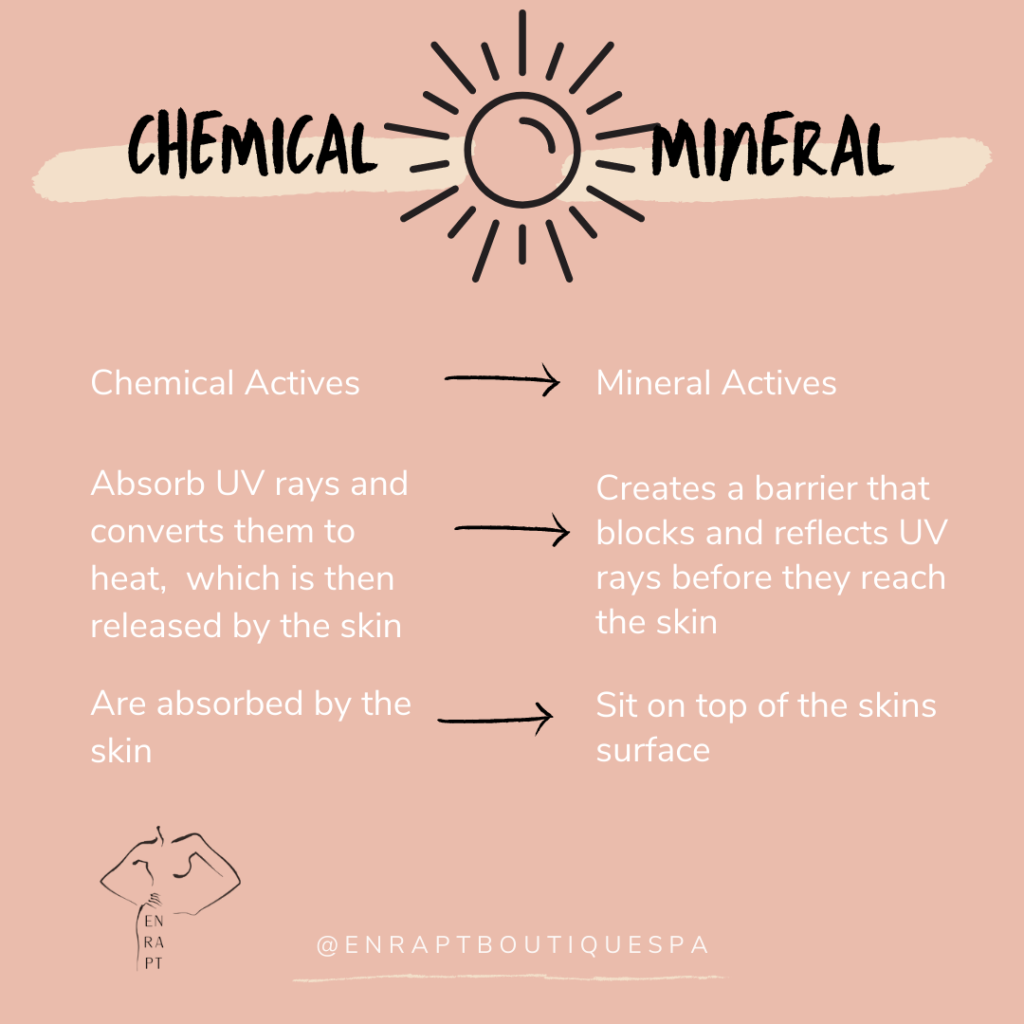SCROLL TO BEGIN
Confessions of a skincare junkie
Clean beauty
CHEMICAL VS MINERAL SPF

Bring on the sun. I love that instant rush of feel-good hormones we get as soon as the sun hits our skin. It’s also a bonus we don’t have to remember to take vitamin D because (well, if you live in Canada) the sun is finally showing its face again. Welcome back…Welcome back.
This time of year is an excellent time to re-evaluate our sun care, though we should be wearing it year-round; I’m not about to yell at you. I’m here to help educate you and give you the down-low ways to help protect your skin.
The biggest question I get asked is the difference between a chemical (traditional) sunscreen and a mineral sunscreen? Both types provide sun protection, but chemical sunscreens and mineral sunscreens differ in their active ingredients and how they protect against UV exposure.
Chemical sunscreens: are often called absorbers because they absorb UV rays; through a chemical reaction, these chemical compounds convert UV rays into heat, then release that heat from the skin.
Mineral Sunscreens: are referred to as reflectors; their active ingredients include zinc oxide and titanium dioxide, which act as physical blockers. These minerals form a protective barrier on the skin and reflect harmful UV rays before contact with the skin’s surface.
Can you guess which one is healthier for the skin? Yup, mineral sunscreen is where it is at! In addition to being a physical blocker, mineral SPF acts as a mirror to reflect UV rays before they can penetrate the skin’s surface. Our skin absorbs 60% of what we put on it; let your SPF be one less thing.
Zinc is one of the main ingredients in most mineral SPF. Zinc helps to keep the skin cool and allows the skin to breathe. For this reason, mineral sunscreen is particularly beneficial in minimizing skin inflammation & redness associated with acne, rosacea, and skin sensitivity.
Here are a few more benefits of mineral SPF 👇👇👇👇
☀Supports collagen production; zinc serves as a co-factor in collagen synthesis by activating the protein collagenase. This protein triggers collagen production to build and repair connective tissue like your skin.
☀Helps with Acne; Studies show that zinc effectively reduces skin inflammation, inhibits the growth of acne-causing bacteria, and regulates sebaceous gland activity. It also has astringent properties, which tighten pores and minimize their appearance.
☀Reef friendly- Mineral sunscreens are friendlier to the environment – zinc oxide and titanium dioxide are kinder to our planet’s delicate coral reefs.
☀Suitable for all skin types, they are gentle enough for the most sensitive skin types with anti-inflammatory properties. They are free of pore-clogging silicones, making them a better option for those prone to blemishes.
☀Broad-spectrum UV protection; Mineral sunscreens reflect UVB and UVA rays from the skin’s surface.

MORE TIPS

We can take many steps to help protect our skin besides SPF, but that doesn’t mean it replaces SPF. Combined with a few more precautions, we can significantly reduce skin damage.
If you don’t already use a Vitamin C serum, you should. Vitamin C is a superstar ingredient for your body and an all-around badass in the skincare department. It can help prevent UV damage, reduce pigmentation, reduce inflammation, and boost skin color.
We love the Rew+Protect internal skincare from Bend Beauty, but did you know that it significantly improves tolerance to UV exposure after eight weeks of use? Learn more here.
Simple things like avoiding midday sun, adding UV protection clothing, or stepping up your outfit with a super cute hat can go a long way in protecting your skin.
BE THE FIRST TO COMMENT